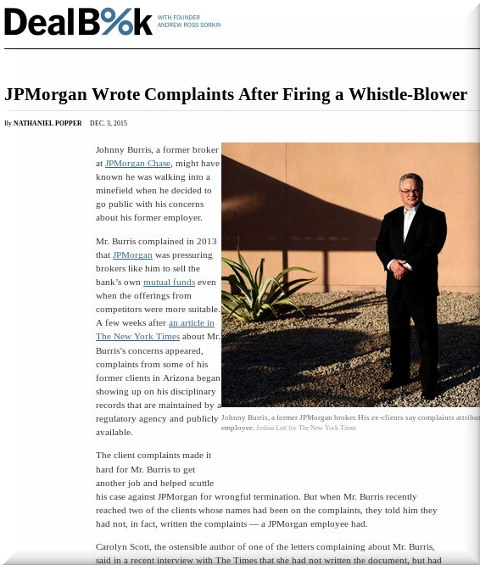

THE EPO is so out of control that the management is threatening bloggers who show embarrassing things (about the management). Recently, with help from the strangely cooperative media, right after a massive PR contract in Washington got signed (for external communication, i.e. press) the EPO's management also produced defamatory [1, 2] attack pieces against a suspended judge. It happened around the same time that I received threatening legal letters. Shortly afterwards the EPO pushed/leaned on the Administrative Council (AC) and pressured a board to oust the suspended judge. Is this all just a coincidence? Seems like the latest media strategy. The timing suggests that it's not improbable.
"Seems like the latest media strategy. The timing suggests that it's not improbable."There was an article on Thursday in the New York Times. It's titled "JPMorgan Wrote Complaints After Firing a Whistle-Blower" and it speaks about how JPMorgan dealt with an ethical person who exposed institutional corruption. JPMorgan manufactured smears against him in order to demonise and get rid of him. One might expect this from the CIA or the NSA, but private companies too use these ugly tactics.
What are we trying to suggest here?
Well, it seems likely that the EPO is doing to the judge whom it suspended (for allegedly speaking about the management) the same thing JPMorgan did to its whistleblower.
"Well, it seems likely that the EPO is doing to the judge whom it suspended (for allegedly speaking about the management) the same thing JPMorgan did to its whistleblower."Regarding the EPO's attack on yours truly, the trigger was something I wrote about PACE, which is a nasty sham that destroyed the EPO's reputation and threatened to drive a wedge between applicants and the EPO (loss of trust). We have already written many pieces which debunk the EPO's talking points regarding PACE, but to recapitulate, consider how they keep PACE a 'pilot' (and low key) so that only large corporations are in it. What if everyone applied? A sham for sure. It doesn't add up. To use the queuing analogy again, the EPO set up a fast lane for business/first class, then alleged that it would speed things up for everyone, not just for the rich (that's the first lie). It then said that anyone could apply to use the business/first class lane. What then is the advantage really? The business/first class becomes just another de facto economy lane. The truth is, only if few (rich) people know the tricks for using the fast lane would it really remain a lane for business/first class.
Watch patent lawyers' media trying to explain PACE. It's nonsensical and it's marketed as some kind of magic potion that can provide "accelerated prosecution of patent applications at the EPO" (only for few selected 'partners').
“You are only taking the risk of being sued for “defamation” by the “EPO”.”
--AnonymousThe point we are trying to make here, the EPO's management is bonkers and it is already using crude personal attacks against perceived 'enemies' (we will give more examples later this month, in relation to staff representatives). Battistelli has gone ad hominem while claiming a personal campaign against him. The hypocrisy!
Watch this comment left earlier today in Merpel's blog: “You are only taking the risk of being sued for “defamation” by the “EPO”.”
“EPO” is in inverted commas probably because the EPO lawyers don't even know what “EPO” actually is.
Here is an even more serious comment from the same comments thread:
The Dutch Court established that the European Patent Organisation of which the AC is a part and the highest supervisory body breaches the Human Rights. It is a fact regardles of whether the order of the Dutch Court can be executed or not due to the immunity issue. Til today the AC failed to change this sorry state of afairs and if any change has taken place it is to the wors.
The EBA which is, for all intents and purposes, an independent court decided that the AC has failed to substantiate properly the allegations of misconduct raised against a member of the Boards and therefore refused the request of the AC. The AC decided to put the board member again before the court (EBA), by requesting a decision of the EBA, again, as far as it is known in the absence of any new and compeling evidenec. This means that the AC is prepared to "knock on the doors" of the EBA until the AC gets what it wants, regardless of the principles of the law.
The above shows that this AC is determined to proceed with its plans no matter what and is prepaired to take any kind of collateral damage.
Thus, I do doubt very much whether an opinion of who-ever it may be, which is not fully supportive of the plans of the AC can be seriously considered by this AC.
--Napoleon Bonaparte